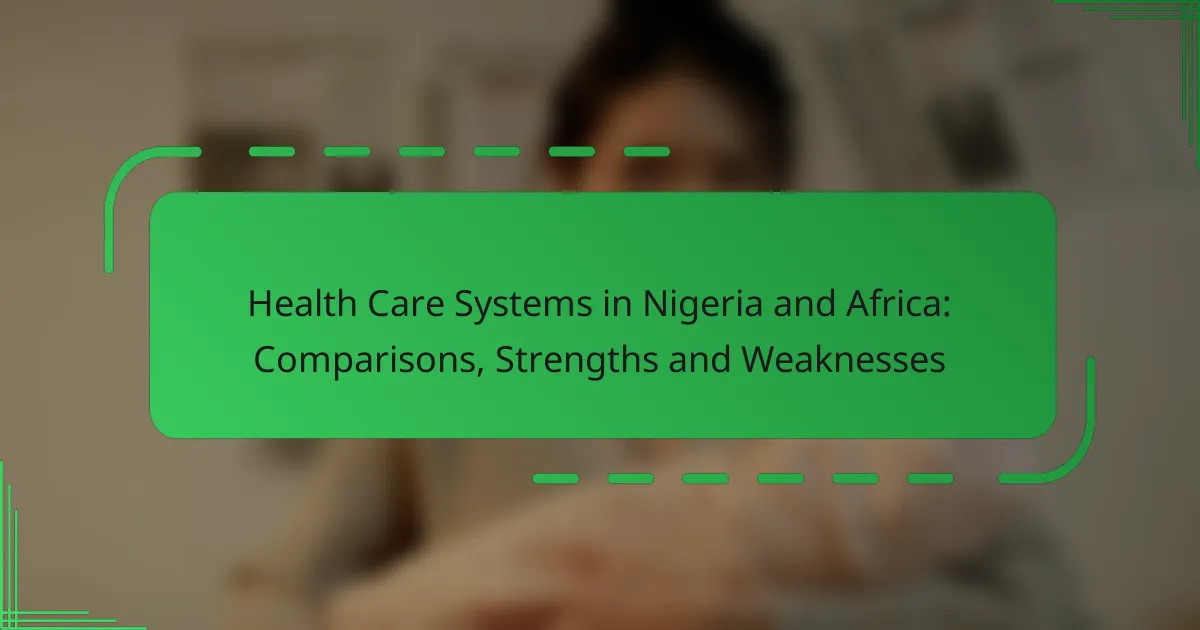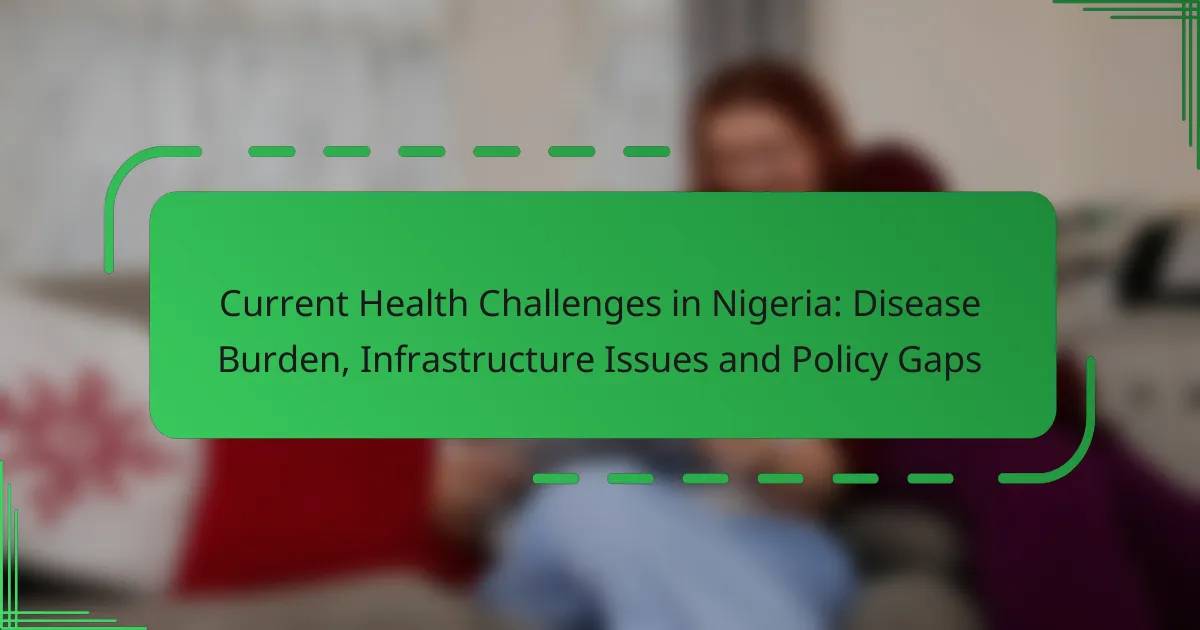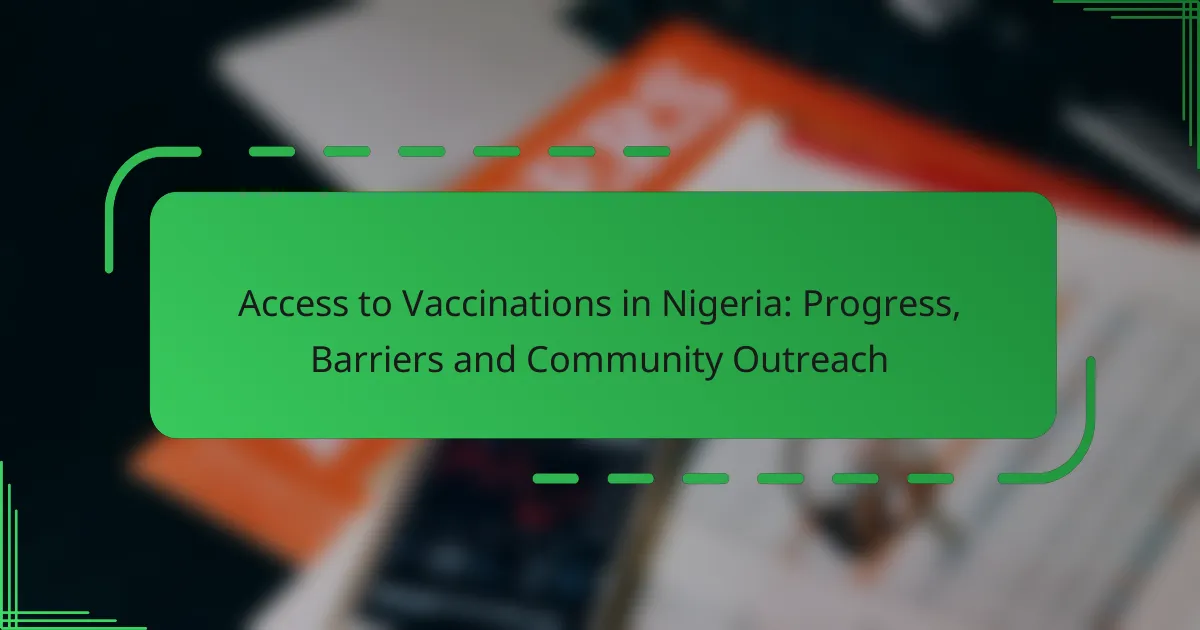The health care systems in Nigeria and across Africa present a complex landscape of strengths and weaknesses. While Nigeria has made strides in improving access to primary health care and implementing community health programs, it still grapples with significant challenges such as inadequate infrastructure and a shortage of medical professionals. These issues not only affect the quality of care but also highlight the disparities in health outcomes when compared to other African nations.
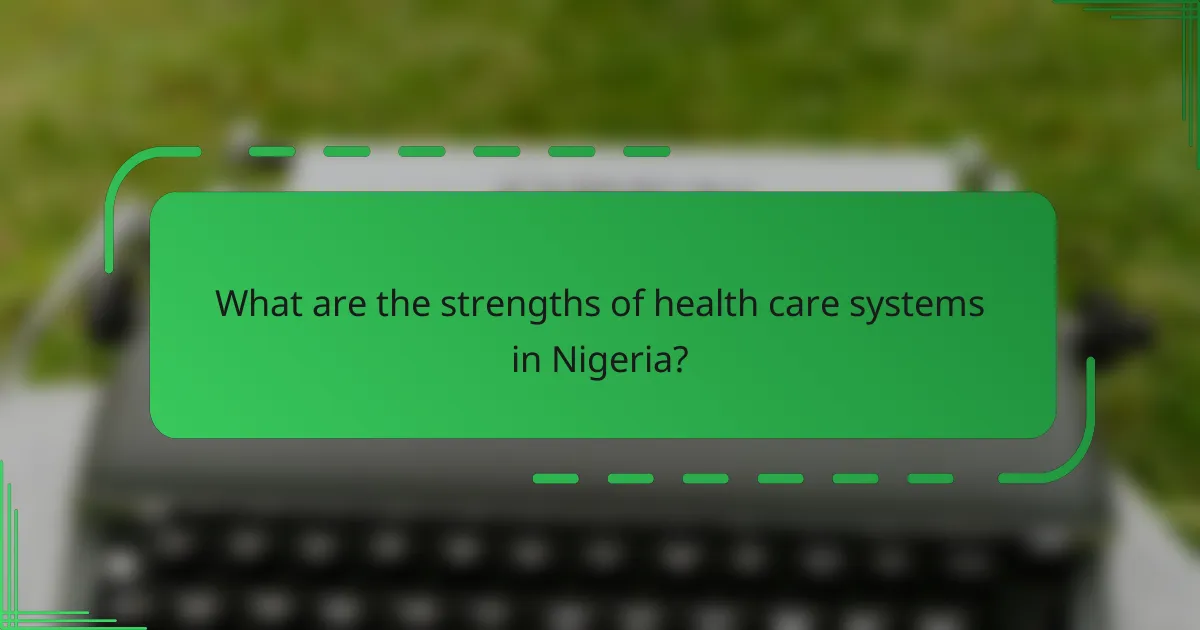
What are the strengths of health care systems in Nigeria?
The health care system in Nigeria has several strengths, including improved access to primary health care, government initiatives for health funding, and active community health programs. These factors contribute to enhancing health outcomes and addressing public health challenges in the country.
Increased access to primary health care
In Nigeria, access to primary health care has significantly improved through the establishment of numerous health facilities across urban and rural areas. This expansion allows more individuals to receive essential health services, which is crucial for early diagnosis and treatment.
Additionally, the introduction of the National Health Insurance Scheme (NHIS) aims to make primary health care more affordable for citizens. This initiative encourages regular health check-ups and preventive care, ultimately leading to better health outcomes.
Government initiatives for health funding
The Nigerian government has implemented various initiatives to increase funding for health care, including the Basic Health Care Provision Fund (BHCPF). This fund is designed to support the provision of essential health services, particularly in underserved areas.
Moreover, partnerships with international organizations and NGOs have bolstered financial resources, allowing for improved infrastructure and service delivery. These efforts are vital in addressing the funding gaps that have historically plagued the health care system.
Community health programs
Community health programs play a crucial role in Nigeria’s health care system by promoting health education and disease prevention at the grassroots level. These programs often involve local health workers who provide services such as immunizations, maternal care, and health education.
By engaging communities directly, these initiatives foster trust and encourage participation in health programs. This localized approach helps to address specific health challenges faced by different communities, leading to more tailored and effective health interventions.
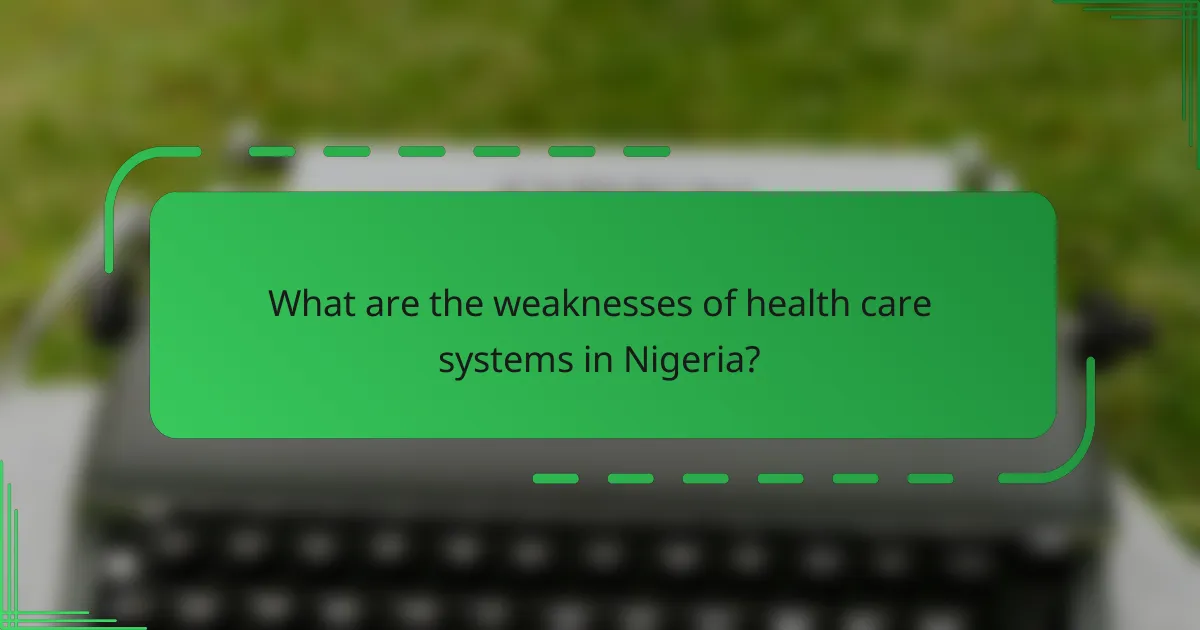
What are the weaknesses of health care systems in Nigeria?
The health care system in Nigeria faces several significant weaknesses, including inadequate infrastructure, a shortage of medical professionals, and limited access to advanced medical technology. These challenges hinder the delivery of effective health services and negatively impact patient outcomes.
Inadequate infrastructure
Nigeria’s health care infrastructure is often insufficient, with many facilities lacking basic amenities such as reliable electricity, clean water, and adequate sanitation. This inadequacy leads to poor patient care and increased risk of infection.
Many hospitals and clinics are overcrowded and poorly maintained, which can discourage patients from seeking necessary medical attention. Upgrading existing facilities and building new ones is crucial for improving health outcomes.
Shortage of medical professionals
The country experiences a significant shortage of qualified medical professionals, including doctors, nurses, and specialists. This shortage is exacerbated by factors such as low salaries, poor working conditions, and limited opportunities for professional development.
As a result, the doctor-to-patient ratio is often unfavorable, leading to long wait times and inadequate patient care. Addressing this issue requires investment in training programs and incentives to retain health care workers in Nigeria.
Limited access to advanced medical technology
Access to advanced medical technology in Nigeria is limited, particularly in rural areas where facilities may lack essential diagnostic and treatment equipment. This gap restricts the ability to provide comprehensive care and can delay critical diagnoses.
Efforts to improve access to technology should focus on partnerships with private sectors and international organizations to enhance the availability of medical devices and training for health care providers.
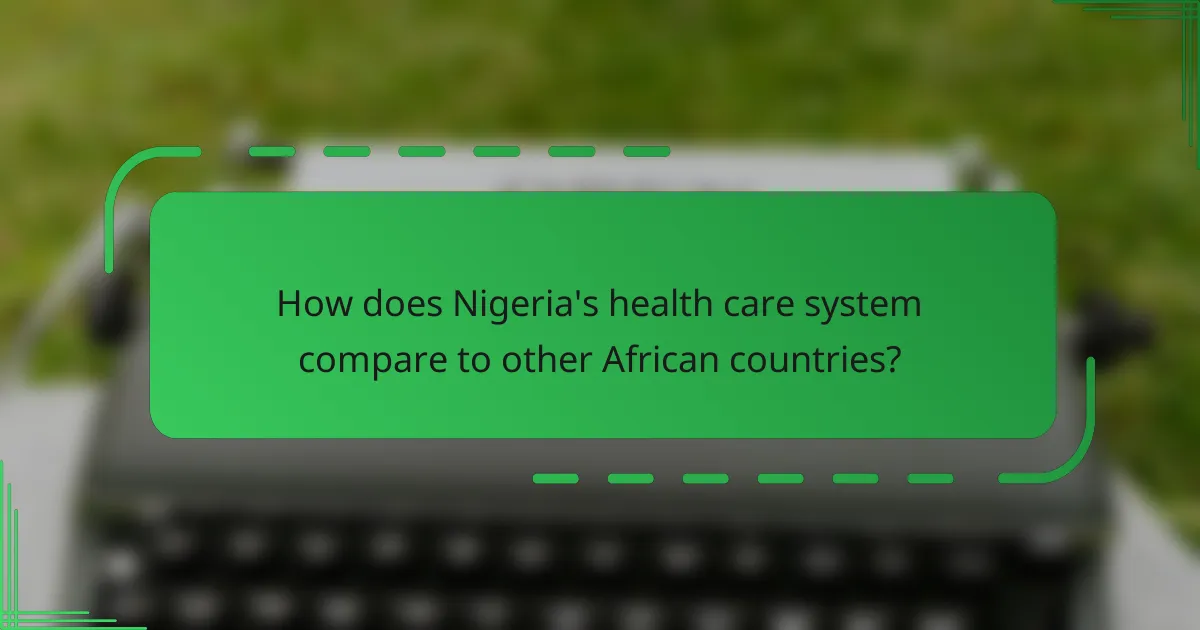
How does Nigeria’s health care system compare to other African countries?
Nigeria’s health care system faces significant challenges compared to other African nations, particularly in terms of accessibility, quality, and funding. While it has a large network of health facilities, the system is often hindered by inadequate infrastructure and resource allocation, impacting overall health outcomes.
Comparison with South Africa’s health care model
South Africa’s health care model is characterized by a dual system comprising both public and private sectors. The public system serves the majority of the population but is often underfunded and overburdened, while the private sector offers high-quality care but is accessible mainly to those who can afford it. In contrast, Nigeria’s health care system struggles with similar issues but lacks the robust private sector that South Africa has developed.
South Africa invests significantly in health care, with a focus on universal health coverage, which contrasts with Nigeria’s fragmented approach. For example, South Africa’s National Health Insurance aims to provide equitable access to health services, whereas Nigeria’s system is marked by disparities in service delivery across regions.
Contrast with Kenya’s health care initiatives
Kenya has made strides in health care reform, particularly with the implementation of the Universal Health Coverage (UHC) program aimed at expanding access to essential health services. This initiative has helped improve health outcomes in rural areas, a challenge that Nigeria continues to face due to its vast population and limited resources.
While both countries grapple with similar health issues, Kenya’s focus on community health workers has proven effective in increasing health service delivery at the grassroots level. Nigeria, on the other hand, often lacks the same level of community engagement and support, which hampers its health initiatives.
Regional disparities in health care quality
In Nigeria, regional disparities significantly affect health care quality, with urban areas typically enjoying better services than rural regions. This imbalance is evident in access to medical facilities, trained personnel, and essential medications, leading to poorer health outcomes in less developed areas.
Similarly, other African countries experience regional disparities, but Nigeria’s vast size and diverse population exacerbate the issue. For instance, health care in the northern regions may be less developed compared to the south, highlighting the need for targeted interventions to address these inequalities and improve overall health care access across the nation.
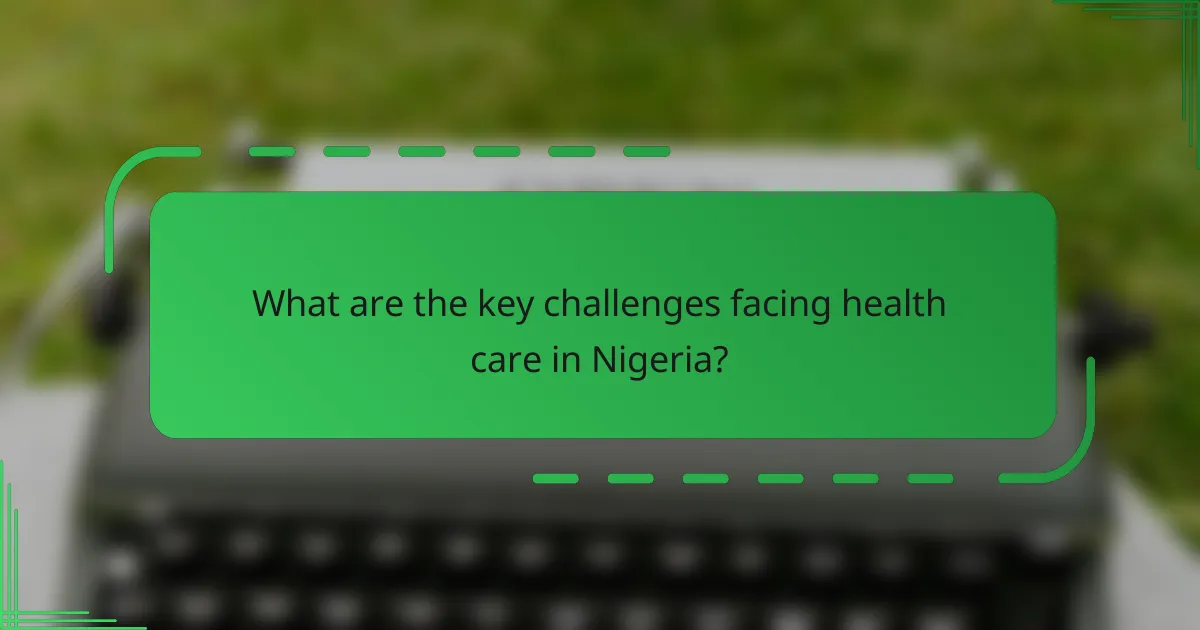
What are the key challenges facing health care in Nigeria?
Nigeria’s health care system faces several significant challenges that hinder its effectiveness, including inadequate funding, corruption, and frequent public health crises. These issues contribute to poor health outcomes and limit access to quality medical services for the population.
Funding and resource allocation issues
Funding for health care in Nigeria is often insufficient, with government spending typically falling short of the World Health Organization’s recommended levels. This leads to inadequate facilities, a shortage of medical supplies, and limited access to essential health services.
Resource allocation is frequently mismanaged, resulting in disparities between urban and rural health care access. Rural areas often receive less funding, which exacerbates health inequalities and limits the effectiveness of health interventions.
Corruption and mismanagement
Corruption is a pervasive issue in Nigeria’s health care system, affecting both public and private sectors. Funds intended for health care improvements often disappear due to fraudulent practices, leaving facilities under-resourced and unable to provide adequate care.
Mismanagement of health care facilities further complicates the situation. Poor leadership and lack of accountability can lead to inefficient operations, waste of resources, and a decline in the quality of care provided to patients.
Public health crises and disease outbreaks
Nigeria frequently experiences public health crises, including outbreaks of diseases such as Lassa fever and cholera. These crises strain the already limited health care resources and highlight the system’s inability to effectively respond to emergencies.
Preparedness for disease outbreaks is often lacking, with insufficient surveillance systems and inadequate public health infrastructure. Strengthening these areas is crucial for improving the overall resilience of Nigeria’s health care system against future health threats.

What frameworks can improve health care delivery in Nigeria?
Improving health care delivery in Nigeria requires a combination of innovative frameworks that leverage resources, streamline processes, and engage communities. Key strategies include public-private partnerships, health care policy reforms, and community engagement strategies that can enhance access and quality of care.
Public-private partnerships
Public-private partnerships (PPPs) can significantly enhance health care delivery in Nigeria by combining the strengths of both sectors. These collaborations can lead to improved infrastructure, increased funding, and better service delivery. For instance, a PPP could involve a private firm building a hospital while the government provides regulatory support and oversight.
Successful PPPs often focus on shared goals, such as improving maternal health or expanding access to essential medicines. When establishing a PPP, it is crucial to define clear roles, responsibilities, and performance metrics to ensure accountability and effectiveness.
Health care policy reforms
Health care policy reforms are essential for addressing systemic issues in Nigeria’s health care system. Reforms may include revising funding mechanisms, enhancing regulatory frameworks, and improving health insurance coverage. For example, implementing a national health insurance scheme could provide broader access to services for low-income populations.
Effective reforms should be evidence-based and consider local contexts, such as regional health disparities. Engaging stakeholders, including health workers and community leaders, can facilitate smoother implementation and foster public trust in the reforms.
Community engagement strategies
Community engagement strategies are vital for improving health care delivery by fostering trust and ensuring that services meet local needs. Involving community members in health initiatives can lead to better health outcomes and increased utilization of services. For instance, training local health workers can enhance outreach and education efforts.
Strategies may include organizing health fairs, conducting surveys to understand community needs, and creating feedback mechanisms for continuous improvement. Successful engagement requires ongoing communication and collaboration with community leaders to ensure that initiatives are culturally relevant and effective.
